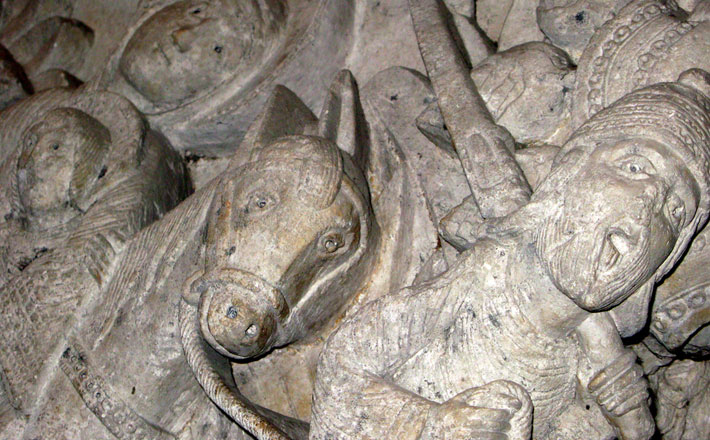Commentary on Hebrews 2:10-18
Once the hoopla of Christmas fades, and the wonder of the new baby in the manger starts to become a memory, Christians rightly turn to the harder questions that arise from the Incarnation, such as “why did God have to come to us in this way?” and “was it necessary for Christ to suffer during his life and especially in his death?”
We ask these questions today, but even at the time of the letter to the Hebrews, people were already asking these questions and attempting to answer them.
The Necessity of the Incarnation
It really does boggle the mind, doesn’t it? Why would God, who created everything that is, and who could come into the world at any time and in any form, choose to become a human being? And why would God choose to commit to living this human life in the exact same way as the rest of us, to be born of a woman as a helpless child? This is the question that the author of Hebrews raises, and answers by saying that “the one who sanctifies and those who are sanctified all have one Father.” In other words, when God decided to save humans, it seemed fitting to do so as a human.
Paul often uses the metaphor of a family to talk about the relationship believers have with one another. Here, the author of Hebrews (traditionally attributed to Paul, but scholars currently consider the authorship unknown) says that by virtue of his humanity, Jesus is also able to claim all people as his brothers and sisters (confirmed by the reference to Psalm 22:22).
The Necessity of Christ’s Suffering as We Do
And having found himself in human form, it follows that Jesus would also experience all that humans do, including suffering. According to Hebrews, unless he were to live and also die as a human does, Jesus could not overcome the death that comes to all humanity. Again, he reminds us that Christ did not come to help angels, but people and therefore he must be like us “in every respect.”
In this way, Jesus is able to show that though living according to the will of God is difficult, it is possible. He shows us what it would truly mean to be a merciful and faithful high priest. Christ is therefore able to make the most perfect sacrifice for the sins of the people.
The Good News of the Incarnation
In my work, I often encounter people who believe that they are special in only one way — that their sufferings are so unique that no one else could possible understand them. And I know what they are talking about. After all, I often feel the same way. But when I think of Christ and how he came to be like us, how he experienced hunger, and grief, and betrayal, and loneliness, and the fear of death, just as we all do, I know that I am not alone. And neither are those who tell me that they are.
By Christ’s humanity, and his embrace of all our challenges, we need never fear that God does not understand our experiences. Indeed, God forgives us from a place of empathy, from a place of commonality. God’s forgiveness comes to us less like that of a magnanimous judge, and more like that of a faithful friend who can enfold us in a hug and say “I know you did the best you could.” By overcoming suffering in his own earthly life, Christ is able to help us in our own suffering. No one could ask for a more merciful and faithful act than to accompany another in suffering.
The Incarnation is absolutely one of the most puzzling acts that God takes in all of history. But when we consider how it makes possible Christ’s most powerful actions as savior, we can see its necessity. Christ willingly accepts the challenges and sufferings of human life in order to release the rest of us from them forever.


January 1, 2017